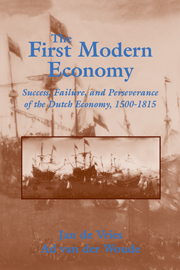1 - By way of introduction
Published online by Cambridge University Press: 26 October 2011
Summary
In its day – and long after – the world admired the Dutch Republic above all for its economic efficiency and social concord. In 1776, Adam Smith could find no more fitting example than the Republic as “a country that had acquired that full complement of riches which the nature of its soils and climate and its situation with respect to other countries allowed it to acquire.” Smith held that such a state of well-ordered efficiency – the goal of classical economics – had been most nearly achieved in Holland, and this gleaming vision of early prosperity has never since lost its hold on the public imagination.
But just what are the lessons to be learned from this celebrated “Dutch case”? Smith had no doubts, but since his time historical perspective has acted more to complicate than to clarify matters. Historians of varied plumage – Eric Hobsbawm, Fernand Braudel, Violet Barbor, and Immanuel Wallerstein come immediately to mind – felt certain that the Dutch achievement was essentially backward looking, the culmination of something with no future. “The emergence of Amsterdam prolonged the old pattern; took place, logically enough, according to the old rules …” pronounced Braudel, while Hobsbawm warned against the temptation “to exaggerate the ‘modernity’ of the Dutch.” Indeed, “to some extent [the Dutch] did a disservice to industrialization in the long run.”
Economists have been tempted to see something more positive, and more connected to the present, in the economic history of the Dutch Republic.
- Type
- Chapter
- Information
- The First Modern EconomySuccess, Failure, and Perseverance of the Dutch Economy, 1500–1815, pp. 1 - 6Publisher: Cambridge University PressPrint publication year: 1997

